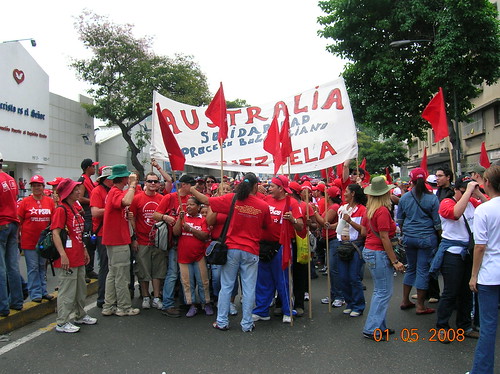AVSN
Join the 2010 `May Day’ solidarity brigade to Venezuela! April 24 - May 2, 2010

Registrations close February 1, 2010
The Australia-Venezuela Solidarity Network’s brigades to Venezuela are a once-in-a-lifetime experience - the opportunity to see first-hand an unfolding revolution that is not only radically transforming the lives of Venezuelans, but is challenging the greed, exploitation and destructiveness of global capitalism by showing that a better world is possible.
Join the AVSN’s “May Day” solidarity brigade, to run from April 24 to May 2, 2010, and visit worker-run factories and cooperatives; free, high-quality public health and education programs; Indigenous controlled programs of sustainable economic development and environmental repair; and community controlled TV and radio stations.
Observe “popular power” at work in Venezuela’s new communal councils, and speak to a wide range of grassroots organisations, community activists, trade unions and government representatives about the radical changes being implemented by the Venezuelan people.
Young Venezuelan revolutionary and environmentalist: `Tomorrow is too late’

“More than just an economic crisis, what humanity faces today is a systemic crisis”, Rangel said. “We can see this if we look at the energy crisis, and the social crisis that is generating a lot of poverty and misery. But above all, we can see this in the ecological crisis. There is a grand ecological crisis in the world today and I believe we are at a pivotal point, a moment when we need to make tough decisions. The current mode of development is incompatible with life.”
Rangel explained that this is why, “in Venezuela, we believe in a model for life and sustainable development where we can generate the greatest possible sum of happiness, not only for this generation, but for future generations”.
Australia: ABC TV's `Foreign Correspondent' program censors Venezuela's majority

By the Australia-Venezuela Solidarity Network
August 12, 2009 -- The Australian Broadcasting Corporation's Foreign Correspondent current affairs TV program screened on August 11, titled “Hugo Chavez: Total Control” did nothing to shore up the ABC’s reputation for well-informed, accurate reporting. Eric Campbell's report from Venezuela was riddled with inaccuracies, half-truths and transparent biases that need to be corrected.
The program’s main message –- that President Hugo Chavez is “the dominator… aiming for total control” in Venezuela -– is the stock-standard propaganda being peddled by a mainstream media that refuses to recognise or reflect the voices of the poor majority in Venezuela.
What “evidence” does Foreign Correspondent present for Chavez’s supposed megalomania?
Melbourne, August 28-29: Latin America Solidarity Conference 2009
December 1-9, 2009: Join the solidarity brigade to Venezuela and the see the revolution first hand

Solidarity protest in Sydney, Australia, July 1, 2009. Photos by Peter Boyle.
Below are just some of the statements released by solidarity groups, left parties and governments, and international organisations demanding the return to power of Honduras' elected presidet Manuel Zelaya. They have been compiled by Australia's Green Left Weekly.To view the complete list, click HERE.
* * *
Statement by the Australia-Venezuela Solidarity Network (AVSN)
Win a trip to Venezuela! Drawn on August 30, 2009
Win
a trip to Venezuela!
…and strengthen the solidarity movement with Venezuela’s
revolution
Venezuela: A balance sheet of the constitutional referendum victory

By Gonzalo Villanueva
Venezuela’s February 15 constitutional amendment referendum, which proposed to modify the existing constitution to allow politicians to stand for re-election without restrictions, was triumphant. However, the referendum was more than a legal amendment – the removal of term limits – it was a political issue: to continue the revolutionary project or not? The Venezuelan people have convincingly signalled their desire to continue with the Bolivarian process, under the leadership of Hugo Chavez. The victory undoubtedly opens a path to advance and deepen the Bolivarian Revolution.
The amendment achieved a significant 6.3 million votes (54% of the vote). These latest electoral result confirms that the chavista camp has recovered significantly from the 2007 constitutional referendum defeat of 4.4 million votes (49.29%), a trend also followed in the 2008 regional elections. However, there is still a shortfall in comparison to the 2006 presidential elections that achieved 7.3 million votes (62.84%).
Democracy wins in Venezuelan referendum; Chavez promises `socialist democracy'

[Click HERE for more coverage of the referendum campaign.]
A statement from the Australia–Venezuela Solidarity Network
February 17, 2009 -- On Sunday, February 15, Venezuelans voted in a referendum to change the country’s constitution to allow elected officials to re-stand for election without restriction. Previously, Venezuela’s constitution allowed elected officials, including the president, to stand for only two terms.
With 94.2% of the votes counted, the National Electoral Council announced that the “Yes” vote had won with 6,003,584 votes (54.36%). The “No” vote received 5,040,082 votes (45.63%). Dozens of election observers from international bodies such as the United Nations and the Organization of American States verified that the referendum was free and fair.
Join the next Australian solidarity brigade to Venezuela! April 15-25, 2009